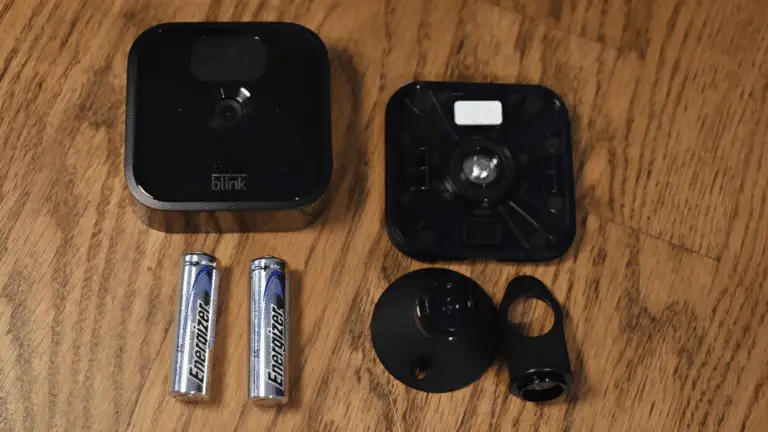Introduction
Can Blink Cameras Use Regular Batteries: Amazon’s Blink cameras are popular home security cameras due to its wireless design, ease of use, and affordability. These cameras are distinguished by their battery power. Blink camera users and buyers sometimes wonder if they can use conventional batteries.
This query stems from the desire to understand the operational costs and convenience associated with maintaining these devices. Blink cameras are designed to operate on two AA lithium batteries, which are known for their long lifespan. The choice of lithium batteries is not arbitrary; it is due to their superior performance in terms of longevity and reliability, especially in devices that need to be always on, such as security cameras.
Exploring Blink camera compatibility with different batteries, their effects on performance and lifespan, and its ramifications. We’ll also explore the manufacturer’s advice and why. Blink camera owners and prospective buyers will benefit from this information.

What happens if you use regular batteries in Blink camera?
Blink devices use AA lithium batteries. These are non rechargeable batteries, but it can also work on alkaline batteries as well as rechargeable Li ion batteries. As the latter two aren’t compatible with Blinks, they can damage your security camera in the long run.
Blink cameras use two AA lithium batteries, which are long-lasting and durable. Using standard alkaline batteries in your Blink camera could cause various issues.
At first, your camera’s power source would last a lot less time. Blink cams that use lithium batteries usually last for two years. But you have to change alkaline batteries more often. Lithium batteries use energy more efficiently and drain faster than alkaline batteries. This means that alkaline cells don’t work as well in systems that are always on, like house alarms.
Second, your Blink camera may work poorly. As they deplete, alkaline batteries lose voltage faster, causing unpredictable performance. Your camera may malfunction and miss crucial moments.
Thirdly, ordinary batteries may void your warranty. Different batteries may void warranties, therefore manufacturers usually specify which ones to use.
Do Duracell power tools work in Blink cameras?
Choose batteries that are compatible with Blink cameras.
While Energizer and Duracell batteries are versatile and can last for years if used properly, some alkaline batteries may not be capacious enough and they may have low operating voltage for Blink cameras.
Duracell, a popular battery maker, makes alkaline and lithium batteries. The type of Duracell battery determines whether it works with Blink cameras.
Blink cameras use two AA lithium batteries. Choose “Duracell Lithium.” if you’re contemplating Duracell batteries. Like other high-quality lithium batteries, these batteries should run Blink cameras reliably and long-lastingly.
Duracell alkaline batteries can power Blink cameras, but it’s not a good idea to do so. No matter what brand, alkaline batteries have less energy per unit area and a slower charging rate than lithium batteries. They would have to be replaced more often, which would raise the cost of upkeep and create more electronic waste. Your Blink camera may not work right sometimes because alkaline batteries lose power more quickly.
Can you buy batteries for Blink cameras?
Available in a pack of 10, these lithium AA batteries will hold their power for up to 20 years. These 3Ah (3000mAh) batteries are 50.5mm in length and 14.5mm in diameter. They are ideal for both Blink indoor cameras and outdoor cameras.
Blink camera batteries are available. Two AA lithium batteries, which are generally available, power the cameras.
These batteries are available at most electronics and home improvement retailers. Amazon, eBay, Walmart, and Best Buy sell them online. Blink cameras function best and last longest with lithium batteries, not alkaline or other varieties.
Brands like Energizer and Duracell make high-performance lithium batteries in addition to generic ones. Although more expensive than generics, these may last longer and work better.
Note that new Blink cameras normally come with lithium batteries, so you won’t need to buy them until they run out. These batteries last two years under typical use, so you won’t need to replace them often.
Can I put other types of batteries in my Blink camera?
Yes, you can use regular AA batteries in Blink cameras. However, it is recommended to use lithium AA batteries as they last longer and perform better in extreme temperatures. Regular alkaline AA batteries may not last as long and may not perform as well in extreme temperatures.
Blink cameras are designed to operate on two AA lithium batteries. While it may be technically possible to use other types of batteries, such as alkaline or rechargeable NiMH batteries, it is not recommended for several reasons.
In the first place, the batteries would not last nearly as long. It is known that lithium batteries have a lot of power, and in normal situations, they can run Blink cameras for up to two years. Alkaline and NiMH batteries, on the other hand, need to be changed more often because they have less energy and discharge more quickly.
Secondly, the performance of your Blink camera could be compromised. Alkaline and NiMH batteries tend to lose voltage more quickly as they discharge. This can lead to inconsistent performance, potentially causing your camera to miss critical moments or fail to function optimally.
Thirdly, using batteries other than the recommended lithium ones could potentially void your warranty. Manufacturers often specify the type of batteries to use with their products, and using different ones might violate the terms of the warranty.
Changing non-lithium batteries more often would raise the cost of upkeep and have a negative effect on the environment. These batteries might be less expensive at first, but the cost of changing them all the time could add up over time. Batteries also add to electronic waste, which is becoming a bigger problem for the earth.
What to do when Blink battery dies?
A: The battery-operated Blink cameras are shipped with two non-rechargeable AA 1.5v Lithium batteries and they’re easy to replace when the time comes. Blink camera batteries should be replaced by Energizer Ultimate 1.5v Lithium AA batteries or the equivalent.
When the battery in your Blink camera dies, it’s important to replace it promptly to ensure your home security system continues to function optimally. Here’s a step-by-step guide on what to do:
Purchase New Batteries
Buy two new AA lithium batteries. These are widely available at electronics stores, online marketplaces, and some supermarkets. Remember, it’s crucial to buy lithium batteries, not alkaline or other types, to ensure the best performance and longevity.
Remove the Old Batteries
Open the battery compartment on the back of your Blink camera. This usually involves sliding or unscrewing the cover. Remove the old batteries and dispose of them responsibly.
Insert the New Batteries
Place the new batteries in the compartment, ensuring the positive and negative ends align with the markings inside the battery compartment.
Close the Battery Compartment
Once the batteries are in place, close the battery compartment.
Check the Camera
After replacing the batteries, check the camera to ensure it’s working properly. You can do this through the Blink app on your smartphone. The camera should reconnect to the system and show a live feed.
Monitor Battery Life
Keep an eye on the battery life through the Blink app. It will alert you when the batteries are running low, so you can replace them before they die.

Why is my Blink batteries dying so fast?
If you’ve received a notification saying that one or more of your cameras have high usage, this means that you won’t get the expected 2 year battery life that Blink cameras offer. High usage means that the amount of motion clips recorded and Live View used is causing the batteries to deplete quicker than expected.
If you find that the batteries in your Blink camera are dying faster than expected, there could be several reasons for this.
Type of Batteries
Blink cameras are designed to operate on two AA lithium batteries, which are known for their long lifespan. If you’re using alkaline or NiMH batteries instead, they will not last as long. Always use lithium batteries for the best performance and longevity.
Increased Usage
The more your Blink camera records, the faster the batteries will drain. If your camera is set to record frequently or for long durations, or if it’s placed in a high-traffic area where it’s triggered often, the batteries will deplete faster.
Wi-Fi Signal Strength
If your Blink camera is too far from your Wi-Fi router, it may use more power to maintain a connection, draining the batteries faster. Try moving your camera closer to the router or using a Wi-Fi extender.
Cold Weather
Lithium batteries can perform poorly in cold weather, which can reduce their lifespan. If your camera is located outdoors in a cold climate, this could be affecting the battery life.
Firmware or Software Issues
Sometimes, a bug in the camera’s firmware or software can cause excessive battery drain. Make sure your camera’s firmware and the Blink app are up to date.
Can I use rechargeable batteries in my Blink camera?
Yes, you can use rechargeable AA lithium batteries in your Blink camera. In fact, Blink recommends using their own branded rechargeable batteries for optimal performance.
Blink cameras are designed to operate on two AA lithium batteries, which are known for their long lifespan and reliable performance. While it may be technically possible to use rechargeable batteries, such as NiMH (Nickel-Metal Hydride), it is not recommended for several reasons.
To begin, rechargeable batteries usually put out less energy than lithium batteries. This lower power can impact performance, and the Blink camera might not work as well as it should or even turn off too soon.
The second thing is that lithium batteries generally last a lot longer than rechargeable batteries in high-drain devices like Blink cameras. This means you’d have to charge and change the batteries more often, which could be inconvenient and take a lot of time.
Thirdly, using batteries other than the recommended lithium ones could potentially void your warranty. Manufacturers often specify the type of batteries to use with their products, and using different ones might violate the terms of the warranty.
Even though portable batteries might seem like a better choice for the environment, you should think about how much energy they use and how they affect the environment when you charge them all the time.
Are batteries included when purchasing a Blink camera?
Yes, when you purchase a new Blink camera, it usually comes with the required batteries included in the package. However, it’s always a good idea to double-check with the retailer or seller to ensure you have everything you need.
When you purchase a new Blink camera, it typically comes with everything you need to get started, including the necessary batteries. Blink cameras are designed to operate on two AA lithium batteries, which are known for their long lifespan and reliable performance.
The inclusion of these batteries with the purchase of a new camera is a significant convenience for the user. It allows you to set up and start using your new security system right away, without needing to buy batteries separately.
The batteries that come with the camera are usually high-quality lithium batteries, which can last up to two years under normal use. This means you won’t need to worry about replacing the batteries for quite some time after your initial purchase.
However, it’s always a good idea to check the product description or ask the seller when buying a Blink camera, just to make sure batteries are included. Different sellers or packages might have different inclusions.

Conclusion
Due to the performance and lifetime variations between lithium and alkaline batteries, Blink cameras should not use them. Blink cameras and other gadgets that need constant power use lithium batteries, which are engineered to last.
Using regular batteries may limit the cameras’ lifespan and cause them to malfunction, making your house less safe. Over time, changing alkaline batteries more regularly will increase maintenance costs and harm the environment, negating any initial savings. The maker recommends lithium batteries to ensure camera performance and longevity.
In essence, while the idea of using regular batteries in Blink cameras might seem appealing due to their wide availability and lower upfront cost, the long-term implications on performance, maintenance, and environmental impact make lithium batteries the more prudent choice. As consumers, understanding these nuances allows us to make informed decisions that not only affect the functionality of our devices but also their impact on our pockets and the planet.

